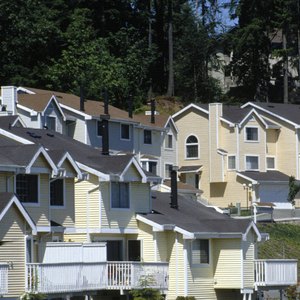
When searching for your dream home, you might find that a townhouse fits your size, location and price specifications. Buyers who measure the pros and cons of owning a townhouse can make the best financial decision. Examining the home's key features helps you predict how well it is likely to hold its value during a housing slump. Researchers have found that some areas do better than others during tough economic times, according to Realtor.com.
The Basics
When compared to typical detached, single-family homes, townhouses are usually cheaper. A townhouse's relatively lower value makes this property type a popular option among first-time buyers and buyers with otherwise limited budgets or means. Due to the lack of yard or lot space, a new townhouse's value may even be lower than that of an older, similar-sized single-family house. Townhouses share structural features with one another, such as walls, roofs, fences and yards; therefore, an individual unit's value retention greatly relies on its location and the entire property's overall upkeep.
Location
As with most housing types, a townhouse's distance from a city's core -- where employment opportunities are usually greatest -- matters. The most dramatic declines in home values occur in the suburbs and distant communities where new construction flourished during a housing boom. A lack of employment opportunities in these areas renders them fiscally vulnerable to housing downturns, as owners must travel further and spend more money to get to work. This leads to a decreased demand and lower values. A townhouse with a prime location when compared to nearby homes will also retains its value better. For example, waterfront townhouses and those with views of golf courses or other scenic landscapes fetch higher sale prices.
Neighborhood
Neighborhoods with high-performing public schools and residents with relatively higher educational levels fare better during tough economic times. A greater demand for housing in such areas supports higher property values for townhouses as well. By contrast, townhouses located in neighborhoods with low-achieving schools and residents who have attained lower levels of education have a harder time retaining value during housing slumps, according to Realtor.com.
Association
Townhouses are typically located within planned communities and run by homeowner's associations. A townhouse HOA helps retain property values by creating and enforcing rules which keep the community's appearance and amenities up to standard. For example, townhouse communities usually restrict owners from selecting unusual exterior paint colors or letting their yards grow wild. When properly run and financed, an HOA preserves overall values. Owners pay monthly dues to cover operating expenses such as security, common-area maintenance and repairs and upgrades for shared structural components.
References
Writer Bio
Karina C. Hernandez is a real estate agent in San Diego. She has covered housing and personal finance topics for multiple internet channels over the past 10 years. Karina has a B.A. in English from UCLA and has written for eHow, sfGate, the nest, Quicken, TurboTax, RE/Max, Zacks and Opposing Views.

